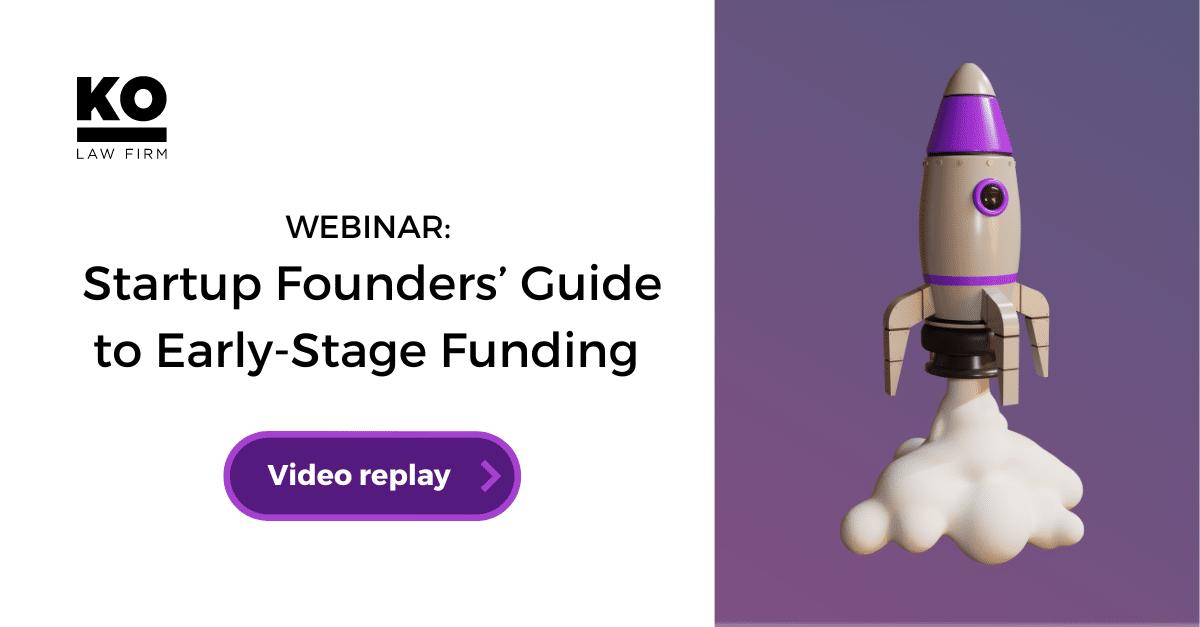Webinar Recap: Startup Founders’ Guide to Early-Stage Funding

- KO Firm
- |
- June 27, 2024
Our recent “Startup Founders’ Guide to Early-Stage Funding” webinar featuring KO partner Kevin Gibson, KO attorney John Kyed, and SpringTime Ventures managing partner Matt Blomstedt demystified common investment vehicles and shared important considerations and best practices for startup fundraising from both a legal and investor perspective. Check out the recap and access the full video recording below.
Preparing for a Financing
Before undergoing a financing, preparation is key. Ensure the company’s corporate governance and documentation are in order before seeking investment. Leveraging your network to find warm introductions to connect with potential investors can facilitate smoother investment discussions. When reaching out to investors, ensure your pitch is well-researched and targeted to the investor’s interests and investment criteria.
Understanding Common Types of Early-Stage Funding
In today’s market, the two most common investment vehicles are Simple Agreements for Future Equity (SAFEs) and priced preferred equity rounds. The speakers discussed why each could be advantageous for certain stages or types of businesses.
A SAFE is not actual equity but a contract commonly used in startup financing that allows investors to receive equity in the future, typically during a subsequent priced preferred equity round or another triggering event like a company sale or IPO.
The two main economic terms in SAFEs are valuation caps, which set a maximum company valuation at which the SAFE will convert to equity, and discounts, which provide a discount on the price per share at which the SAFE converts. Valuation caps protect early investors by ensuring conversion at a predetermined valuation, while discounts allow conversion at a reduced price compared to new equity.
Valuation caps are based on the company’s growth trajectory and are justified based on the company’s capital requirements and margins. Valuations caps will influence the degree of dilution that founders are willing to accept and will impact an investor’s interest in the company.
SAFEs are popular in early-stage startup financing due to their simplicity and efficiency. Challenges with SAFEs include uncertainty about ownership percentage post-conversion and the absence of immediate equity.
A priced preferred equity round is a type of financing where a company raises capital by selling preferred stock at a set price per share. This results in investors holding shares of preferred stock, which have specific rights and preferences in favor of the preferred holders. Priced equity rounds are used both in early-stage startup financings as well as for more mature companies seeking additional capital for growth.
These rounds typically involve negotiations on economic terms (e.g., liquidation preferences, dividends) and control terms (e.g., voting rights, board seats).
Key Considerations and Best Practices for Early-Stage Funding
The speakers highlighted the importance of reasonable valuations and warned against setting an excessively high valuation early on, as it may cause problems in subsequent funding rounds. Companies that fail to meet high expectations risk flat or down rounds.
Founders should also ensure they can hit key milestones to set themselves up to raise future funds. Raising money without the ability to achieve these goals can lead to challenges in securing additional rounds of funding.
The speakers also advised founders to be mindful of economic terms, particularly liquidation preferences in the event of a company’s sale or liquidation, noting that a 1x liquidation preference is standard and cautioning against higher preferences unless in dire situations.
The webinar also covered dilution and the importance of founders maintaining a significant ownership stake. Founders should model potential dilution across multiple funding rounds to ensure they remain incentivized.
It is also important to establish robust vesting schedules for founders and advisors to ensure that equity remains with those actively involved in the company, preventing future dilution problems, or the “dead equity problem,” where an out-sized portion of equity is held by former founders or advisors who are no longer contributing to the business.
The speakers also discussed control dynamics between founders and investors and highlighted the importance of board composition and protective provisions, urging founders to be cautious about giving up too much control. Founders should seek balanced board representation and be wary of investor demands that exceed typical oversight requirements.
Engaging with experienced professionals can help startups effectively navigate the fundraising process while protecting the interests of their business for the future. Check out the full webinar below to learn more.
Tune in to the full webinar video recording below:
Kevin Gibson is a corporate partner at KO Law who can be reached at [email protected]. John Kyed is a corporate attorney at KO Law who can be reached at [email protected]. Matt Blomstedt is managing partner of SpringTime Ventures and can be reached at [email protected].




